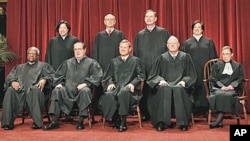The U.S. Supreme Court opened its annual term Monday, and legal analysts say the High Court is likely to rule on some high-profile domestic issues in the months ahead that could have an impact on next year’s presidential election.
Legal experts say it is likely the nine-member Supreme Court will take up the question of whether President Barack Obama’s signature health care reform is constitutional. Obama administration officials recently asked that the high court take up the health care law, which already faces several challenges from individuals and states in the lower courts.
At the heart of the issue is whether a mandate in the law requiring Americans to buy health insurance is permissible under the U.S. Constitution.
The controversial health care law continues to be a main point of attack for the Republican presidential candidates and a High Court decision by next June could have a political impact on next year’s U.S. presidential election.
Texas Governor and presidential contender Rick Perry promised to strike down the health care law during a campaign appearance in New Hampshire.
“On my first day in office I will pull out probably a Sharpie [pen] and I will put my signature to an executive order to wipe out as much of Obama-care as I can using that technique,” said Perry.
Analysts say it is hard to predict how the High Court would rule on the conservative challenge to the health care law. Miguel Estrada argued several cases before the Supreme Court as an official with the Justice Department in the 1990s.
“The issues are really hard. Every time you ask the Supreme Court to overturn an act of Congress, it is a very difficult thing for the court to do. And Congress comes to the Supreme Court with a presumption of deference [to Congress] and constitutionality,” said Estrada.
In addition to the health care law, the Supreme Court also could take up a controversial immigration law in Arizona that allows police officers to check immigration papers of people they suspect may be in the country illegally. The Obama administration opposes the law and says it could lead to racial profiling.
The High Court also is expected to consider various cases involving privacy rights, as well as the power of the federal government to regulate offensive content on television.
Legal experts expect several significant rulings over the next several months from a court led by Chief Justice John Roberts.
Caroline Fredrickson, president of the American Constitution Society, said, “The Supreme Court’s October 2011 term has the potential to be a real blockbuster. Already on the court’s docket are questions about whether the government can place a GPS tracking device on a suspect’s car without first obtaining a warrant.”
The so-called GPS case involves the question of whether police need to secure a court warrant before placing a Global Positioning System device to the car of a suspected drug dealer, one of several privacy cases due to come before the High Court this term.
The court remains ideologically split with four justices regularly voting as a conservative bloc and four others generally making up a liberal faction. Justice Anthony Kennedy is seen as a moderate or swing vote, who often casts the deciding vote in cases that split the court along liberal and conservative lines.
US Supreme Court Opens Term With Crucial Cases
- By Jim Malone











